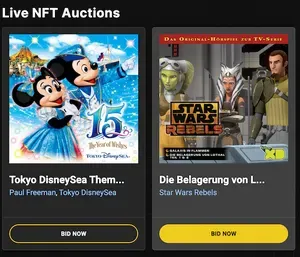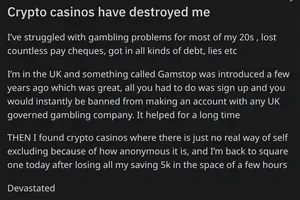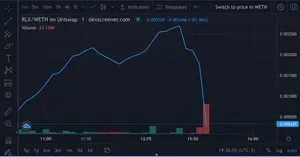The project's website writes, "Each time an artist's NFT is purchased or sold, a royalty from each transaction is accounted to the rights holders account." They do not write about how this is supposed to work when the artists have had zero involvement in the NFT being created to begin with, or have no cryptocurrency wallets at all. The FAQ also includes a hilariously handwavy answer to the question most people learning about NFTs have: "What utility does owning an NFT give me?" HitPiece writes, "Artists provide NFT owners access and experiences."
HitPiece catches heat for selling song and album NFTs without seeking consent from the artists
 You have to admit they have guts for so prominently listing stolen IP from the notoriously-litigious Disney (attribution)
You have to admit they have guts for so prominently listing stolen IP from the notoriously-litigious Disney (attribution)Someone sends COVID-19 NFTs to all ~100,000 active users of the HEN NFT marketplace, whether they want them or not
About 30 posts in a subreddit about gambling addiction mention crypto in the month of January
Regardless of whether they are trying to use blocking software or not, some people in the subreddit appear to be struggling with the challenges presented to them by cryptocurrencies. Some speak about gambling in cryptocurrency casinos, while others have realized that the behaviors that many people involved with cryptocurrencies simply refer to as "investing" are actually manifestations of their gambling addiction. One poster wrote, "Realised yesterday whilst out walking my dog that i'd used crypto as a way to satisfy my gambling urges. I've self excluded from gambling sites for a few years now and managed to taper off. Crypto pulled me back in with trading. I was lying to myself that I was 'investing' so its fine which eventually turned into 24/7 chart watching and leverage trades."
The World Wildlife Fund announces their upcoming NFT project... for nature!
This was not the WWF's first foray into NFTs — the German arm of the WWF released a "Non-Fungible Animals" NFT project in November 2021, which has enjoyed less than $10,000 in trading volume. It also did't appear to be the only project the WWF UK had planned — their NFT website advertised upcoming collaborations with CyberKongz (built on the Ethereum blockchain) and World of Women (also built on the Ethereum blockchain).
Realux, a project promising to "democratize" and "resolve the wealth gap" in real estate, rug pulls $23,000 only hours after launch
After backlash, Troy Baker announces he will no longer be partnering with the "voice NFT" project Voiceverse
All "iloveponzi"'s apes gone! Veteran hacker makes $700,000 stealing and flipping big name NFTs
Tax season begins to hit crypto Reddit hard
Questions like "How can crypto be a viable currency if every transaction is taxed?" are beginning to pop up as well, and more than a few commenters have described their plans to not report any of their crypto activity — certainly a wise thing to be discussing on a public Internet forum.
Streamer Ice Poseidon admits to scamming his followers out of $500,000 with his "Cxcoin" made for streamers
On January 31, 2022, a YouTuber named Coffeezilla released a video in which he confronted Denino about his actions and urged him to return the money to his fans who'd bought in on the project. Denino replied, "I could give the money back, it is within my power, but I am going to look out for myself and not do that." According to Coffeezilla, Denino took a total of $200,000 from the token's presale, $250,000 that was earmarked for marketing, and $300,000 from the liquidity pool. In the end, Denino pocketed around $300,000 and his developers took around $200,000. After realizing that Coffeezilla would be releasing the interview, Denino promised to "use the buyback function to put 155k into the liquidity" — which turned out to mean 155,000 BNB rather than dollars, roughly equivalent to around $40,000.
- "This Famous Livestreamer Stole $500,000 From His Fans", video by Coffeezilla
- Tweet by coffeebreak_YT







